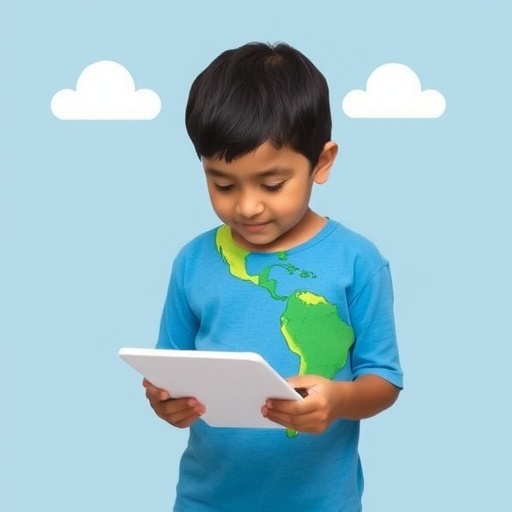In a groundbreaking study aiming to enhance environmental awareness among the youth, researchers have meticulously designed and validated an innovative tool intended for Mexican schoolchildren. This initiative addresses pressing issues such as water conservation, recycling, solid waste management, and the responsible disposal of medications. By focusing on educational programs, the authors seek to cultivate a generation of environmentally literate individuals who understand the importance of sustainable practices.
Environmental literacy plays a crucial role in shaping the attitudes and behaviors of future citizens towards ecological challenges. The authors of this research, Gómez-Oliván, Téllez-López, and Orozco-Hernández, draw attention to the imperative nature of instilling these values in children, who are the stewards of tomorrow. The tool developed in this study is not merely an assessment; it is a comprehensive resource that can empower educators to integrate environmental topics into their curricula effectively.
With the growing concerns over climate change, pollution, and dwindling natural resources, the demand for educational approaches that foster environmental stewardship has never been more critical. The tool’s creators have meticulously structured it to meet the unique needs of Mexican students, taking into account cultural contexts and regional environmental challenges. By tailoring the content specifically for this demographic, the researchers ensure that the material is relatable and impactful.
The validation process of the environmental literacy tool involved rigorous testing and feedback from both educators and students. The authors implemented a comprehensive methodology that included surveys, focus groups, and pilot programs in various educational settings. This systematic approach ensured the tool’s effectiveness and reliability, demonstrating that it truly meets its intended goals.
Water conservation is a significant aspect of this educational tool, addressing a critical issue faced by many communities in Mexico. The tool equips students with the knowledge necessary to understand the water crisis, encouraging them to adopt simple yet effective water-saving practices in their daily lives. This knowledge can lead to a broader understanding of how individual actions contribute to the preservation of vital resources.
Another vital component of the tool focuses on recycling and solid waste management. Given the increasing amount of waste generated by urbanization and industrialization, teaching children about recycling practices and waste segregation is essential. By doing so, the tool aims to instill a sense of responsibility in students, motivating them to become proactive members of their communities in the fight against wastefulness.
Medication disposal is often an overlooked aspect of environmental education. However, improper disposal of pharmaceuticals can lead to serious environmental consequences, including water contamination. The research emphasizes the importance of teaching children safe disposal methods, which can significantly reduce the risk of harmful substances entering ecosystems. By empowering students with this knowledge, the tool aims to create a more conscientious generation.
The publication of this pivotal research in “Environmental Science and Pollution Research” signals a significant step towards addressing environmental educational gaps in Mexico. It encourages other scholars and educators to explore similar avenues, fostering a collaborative approach to global environmental concerns. By sharing methodologies and findings, the study aims to inspire further research and development of educational tools worldwide.
The potential impact of such tools cannot be understated. Educating young individuals about environmental issues fosters critical thinking and encourages them to engage in community initiatives. The approach taken in this research serves as a model for other countries grappling with similar environmental challenges. It presents an opportunity to develop tailored solutions that resonate with local contexts and cultures.
As the urgency surrounding climate action continues to grow, studies such as this one remind us of the importance of grassroots activism starting from the classroom. By incorporating environmental literacy into school curricula, we empower the next generation to advocate for sustainable practices in their communities and beyond. It is this collective action that can drive meaningful change in the way societies interact with their environments.
This research also offers valuable insights for policymakers. By acknowledging the significance of environmental education, governments can promote funding and resources for schools to implement similar programs. Investing in the future by educating young minds about environmental responsibility is a crucial step towards achieving national and international sustainability goals.
In conclusion, the development of a tailored environmental literacy tool for Mexican schoolchildren represents a vital contribution to both education and environmental activism. The ongoing collaboration between researchers, educators, and students will be essential in refining and implementing such tools effectively. As we look towards a more sustainable future, equipping young individuals with the knowledge and skills necessary to navigate environmental challenges is indeed a worthy investment.
The findings from this study will undoubtedly resonate beyond the borders of Mexico, offering a framework that can be adapted to various cultural and educational contexts worldwide. Addressing environmental issues through education is not just beneficial; it is imperative for the survival of our planet. Through tools like this, we cultivate not only awareness but also action—transformative forces that can unite communities in the common cause of environmental sustainability.
As this essential work continues to gain recognition, it invites us all to consider our role in the larger picture of ecological stewardship. Each step taken in educational initiatives marks progress toward a more profound understanding of our relationship with the planet, underscoring the crucial role that education plays in shaping a sustainable future.
Subject of Research: Development and validation of an environmental literacy tool for Mexican schoolchildren focusing on water conservation, recycling, solid waste management, and medication disposal.
Article Title: Design and validation of an environmental literacy tool for Mexican schoolchildren: guiding curriculum-based interventions on water conservation, recycling, solid waste management, and medication disposal.
Article References:
Gómez-Oliván, L.M., Téllez-López, A.M., Orozco-Hernández, J.M. et al. Design and validation of an environmental literacy tool for Mexican schoolchildren: guiding curriculum-based interventions on water conservation, recycling, solid waste management, and medication disposal.
Environ Sci Pollut Res (2025). https://doi.org/10.1007/s11356-025-37231-4
Image Credits: AI Generated
DOI: https://doi.org/10.1007/s11356-025-37231-4
Keywords: Environmental literacy, education, water conservation, recycling, solid waste management, medication disposal, Mexico.




